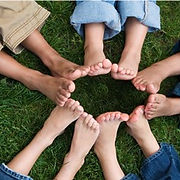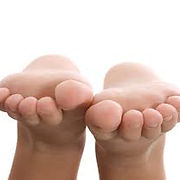Cheltenham 9583 4000
Frankston 8707 0830
Mt ELIZA 1300 776 055

childrens podiatry
keeping kids active through foot health
Children's feet are not just smaller versions of adult feet.
The bones are softer which ossify and grow as your child develops into a teenager and adult. The foot is protected by a large fat pad and is highly flexible. Most toddler's foot posture is often flatter as the ligaments and tendons are not yet fully developed. Children generally start walking from 8-18 months. Consult with Base Podiatry for any concerns you may have about your child's foot posture or gait.

Severs Heel (Calcaneal Apophysitis)
Severs heel is a common injury affecting the growth plate in the heel bone (calcaneus) of young children and teenagers (generally ages 8-15 years old). This period coincides with an increase in growth and generally an increase in sports and activity. The growth plate in the heel is subject to increased forces from sports such as football, netball, soccer and basketball due to the high impact from running and jumping.
Symptoms are generally worse after activity. The good news is Severs is a temporary condition with no long term affects. If symptoms last longer than 2 weeks then, active treatment may be required to enable your child to continue sport. Foot posture, muscle and tendon flexibilty and footwear are the main areas that need to be addressed to limit the affect Severs heel may have on your child's sport and activity.

Children's Shoes
As your child learns to walk it is important to allow your child to be barefoot when safe. Shoes should only be worn in the early months to protect your child's feet from sharp objects outside. These barefoot periods help your child's feet develop important balance, proprioception and coordination.
Your child's footwear needs to allow for growth and normal development. A flexible sole and soft uppers are ideal to allow your child's feet to develop naturally. Having a proper fit including length and width is important to ensure you child's feet aren't restricted or damaged. Good fitting shoes is the most important thing in a child's footwear selection.
Shoes should be checked regularly for fit and wear and be appropriate for the season. Sandals in Summer and closed shoes in Winter. Children's feet tend to grow quite rapidly in the early years and it may seem like you are buying shoes every 6 months.
Skin and Nails
Many children have issues with their skin and nails. Ingrowing nails, plantar warts and excessive sweating and odour can often pose a problem your young one.
Ingrowing nails can develop from poor nail cutting, tight footwear, trauma and hereditary nail shape (involuted and rounded nail plate). Most often proper cutting technique and good fitting shoes can alleviate this. In cases that are persistant and do not resolve, nail surgery can be performed to prevent the nails from becoming ingrown. This is a safe procedure performed by the podiatrist under local anaesthetic to remove the offending nail and prevent it's return.
Plantar warts (verrucae, pappiloma) are common in children and are easliy picked up from local swimming pools and shared spaces. Treatment is often unnecessary in children as most plantar warts resolve in the first 12 months. Treatment is only required if the plantar wart is painful to walk on or lingers beyond a 12 month time frame. This can involve a number of techniques of which the best method will be discussed with you and your child to provide the most pain free and effective treatment.


Flat Feet (Pes Planus)
Children will often have a flatter foot posture as they learn to walk. This is because the muscles and ligaments are still developing and the foot is quite supple and flexible. The majority of children develop normal foot posture which allow them to run and play sport freely. There are some children that maintain a flat footed posture. This is often hereditary and mum's will blame dad and vice versa. This lower and more flexible arch can lead to symptoms in the foot and legs. This is generally dependant on the level of sport, rapid growth or poor footwear.
If your child develops symptoms in their feet or legs (pain after/during sport or periods of standing and walking) then their foot posture may be a factor. The podiatrist's at Base Podiatry can assess and treat conditions associated with foot posture and developement and give you the right advice for your child's development.



